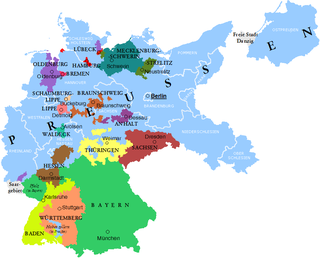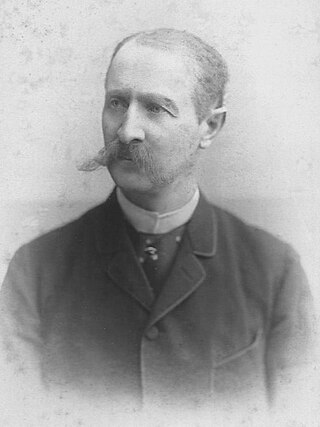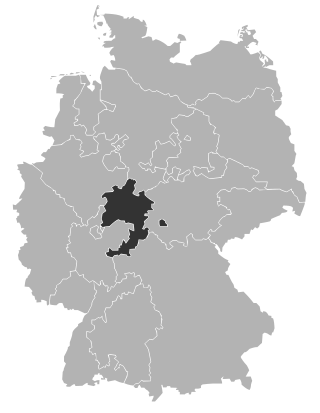Related Research Articles

The County of Waldeck was a state of the Holy Roman Empire and its successors from the late 12th century until 1929. In 1349 the county gained Imperial immediacy and in 1712 was raised to the rank of principality. After the dissolution of the Holy Roman Empire in 1806 it was a constituent state of its successors: the Confederation of the Rhine, the German Confederation, the North German Confederation, and the German Empire. After the abolition of the monarchy in 1918, the renamed Free State of Waldeck-Pyrmont became a component of the Weimar Republic until divided between Hannover and other Prussian provinces in 1929. It comprised territories in present-day Hesse and Lower Saxony (Germany).

Bad Arolsen is a small town in northern Hesse, Germany, in Waldeck-Frankenberg district. From 1655 until 1918 it served as the residence town of the Princes of Waldeck-Pyrmont and then until 1929 as the capital of the Waldeck Free State. The International Tracing Service has its headquarters in Bad Arolsen.

Landtag elections in the Free State of Bavaria (Freistaat Bayern) during the Weimar Republic were held at irregular intervals between 1919 and 1932. Results with regard to the total vote, the percentage of the vote won, the number of seats allocated to each party and the change in distribution of seats are presented in the tables below. On 31 March 1933, the sitting Landtag was dissolved by the Nazi-controlled central government and reconstituted to reflect the distribution of seats in the national Reichstag. The Landtag subsequently was formally abolished as a result of the "Law on the Reconstruction of the Reich" of 30 January 1934 which replaced the German federal system with a unitary state.

Alexis was a lieutenant general, statesman, and the Prince of Bentheim and Steinfurt from 28 September 1890 to 21 January 1919.

The Evangelical Church of Kurhessen-Waldeck is a United Protestant church body in former Hesse-Cassel and the Waldeck part of the former Free State of Waldeck-Pyrmont.
The 1919 Hamburg state election was held on 16 March 1919 to elect the 160 members of the Hamburg Parliament. Despite the SPD winning an absolute majority, they still formed a coalition with the former members of the senate as well as the DDP in parliament, the SPD even allowed the incumbent independent mayor, Werner von Melle, to stay in office. This election is regarded as the first fully democratic election in Hamburg since everyone, including women, were allowed to vote.
The 1919 Hessian state election was held on 26 January 1919 to elect the 70 members of the Hessian constituent people's assembly.
The 1919 Coburg state election was held on 9 February 1919 to elect the 11 members of the Landtag of the Free State of Coburg.
The 1919 Mecklenburg-Schwerin state election was held on 26 January 1919 to elect the 64 members of the Landtag of the Free State of Mecklenburg-Schwerin.
The 1919Mecklenburg-Strelitz state election was held on 30 March 1919 to elect the 35 members of the Landtag of the Free State of Mecklenburg-Strelitz.
The 1919 Oldenburg state election was held on 23 February 1919 to elect the 48 members of the constituent assembly of the Free State of Oldenburg. The election was held in Birkenfeld on 9 March.
Elections in the Free Hanseatic City of Bremen (Freie Hansestadt Bremen) to its state parliament, the Bürgerschaft, during the Weimar Republic were held at variable intervals between 1919 and 1930. Results with regard to the total vote, the percentage of the vote won and the number of seats allocated to each party are presented in the tables below. On 31 March 1933, the sitting Bürgerschaft was dissolved by the Nazi-controlled central government and reconstituted to reflect the distribution of seats in the national Reichstag. The Bürgerschaft subsequently was formally abolished as a result of the "Law on the Reconstruction of the Reich" of 30 January 1934 which replaced the German federal system with a unitary state.

Landtag elections in the Free State of Mecklenburg-Schwerin (Freistaat Mecklenburg-Schwerin) during the Weimar Republic were held at irregular intervals between 1919 and 1932. Results with regard to the total vote, the percentage of the vote won and the number of seats allocated to each party are presented in the tables below. On 31 March 1933, the sitting Landtag was dissolved by the Nazi-controlled central government and reconstituted to reflect the distribution of seats in the national Reichstag. The Landtag subsequently was formally abolished as a result of the "Law on the Reconstruction of the Reich" of 30 January 1934 which replaced the German federal system with a unitary state.
Landtag elections in the Free State of Mecklenburg-Strelitz (Freistaat Mecklenburg-Strelitz) during the Weimar Republic were held at irregular intervals between 1918 and 1932. Results with regard to the total vote, the percentage of the vote won and the number of seats allocated to each party are presented in the tables below. On 31 March 1933, the sitting Landtag was dissolved by the Nazi-controlled central government and reconstituted to reflect the distribution of seats in the national Reichstag. The Landtag subsequently was formally abolished as a result of the "Law on the Reconstruction of the Reich" of 30 January 1934 which replaced the German federal system with a unitary state.

Landtag elections in the Free State of Oldenburg (Freistaat Oldenburg) during the Weimar Republic were held at irregular intervals between 1919 and 1932. Results with regard to the total vote, the percentage of the vote won and the number of seats allocated to each party are presented in the tables below. On 31 March 1933, the sitting Landtag was dissolved by the Nazi-controlled central government and reconstituted to reflect the distribution of seats in the national Reichstag. The Landtag subsequently was formally abolished as a result of the "Law on the Reconstruction of the Reich" of 30 January 1934 which replaced the German federal system with a unitary state.

Landtag elections in the Free State of Lippe (Freistaat Lippe) during the Weimar Republic were held at irregular intervals between 1919 and 1933. Results with regard to the total vote, the percentage of the vote won and the number of seats allocated to each party are presented in the tables below. On 31 March 1933, the sitting Landtag was dissolved by the Nazi-controlled central government and reconstituted to reflect the distribution of seats in the national Reichstag. The Landtag subsequently was formally abolished as a result of the "Law on the Reconstruction of the Reich" of 30 January 1934 which replaced the German federal system with a unitary state.
Landtag elections in the Free State of Schaumburg-Lippe (Freistaat Schaumburg-Lippe) during the Weimar Republic were held at 3-year intervals between 1919 and 1931. Results with regard to the total vote, the percentage of the vote won and the number of seats allocated to each party are presented in the tables below. On 31 March 1933, the sitting Landtag was dissolved by the Nazi-controlled central government and reconstituted to reflect the distribution of seats in the national Reichstag. The Landtag subsequently was formally abolished as a result of the "Law on the Reconstruction of the Reich" of 30 January 1934 which replaced the German federal system with a unitary state.
The 1922 Waldeck state election was held on 21 May 1922 to elect the 17 Landesvertreter of the Free State of Waldeck.
The 1925 Waldeck state election was held on 17 May 1925 to elect the 17 Landesvertreter of the Free State of Waldeck. This was the last election conducted in Waldeck before the state merged with the Free State of Prussia on 1 May 1929.

State elections in the Free State of Waldeck during the Weimar Republic were held at 3-year intervals between 1919 and 1925. Results with regard to the total vote, the percentage of the vote won and the number of seats allocated to each party are presented in the tables below. Pyrmont, in accordance with the results of a plebiscite, was detached from Waldeck and incorporated into the Free State of Prussia on 30 November 1921. Following a second plebiscite, Waldeck itself also subsequently merged with Prussia on 1 May 1929.
References
- 1 2 Gonschior, Andreas. "Der Freistaat Waldeck Landesvertretungswahl 1919". Wahlen in der Weimarer Republik. Archived from the original on 2001-05-25. Retrieved 16 May 2021.
- ↑ "German States to 1949" . Retrieved 27 January 2023.
- ↑ Schröder, Valentin. "Landtagswahlen Staat Waldeck". Wahlen in Deutschland. Archived from the original on 2005-02-24. Retrieved 16 May 2021.